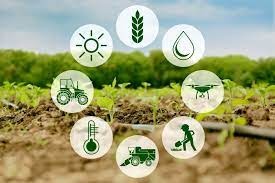ISLAMABAD: Well-functioning economic sectors ensure smooth and efficient transactions, which in turn encourage long-term growth and stability, officials said.
“Enhancing the competitiveness of economic sectors, including agriculture, industry, and services, requires the adoption and implementation of prudent measures,” Asim Saeed, Member of Planning Commission of Pakistan, said at an event organised in the federal capital to mark the 10th anniversary of the launch of China-Pakistan Economic Corridor (CPEC).
Agriculture, the backbone of Pakistan’s rural economy, has enormous potential to resolve the country’s economic woes through reducing dependence on imports, expanding exports, and driving growth in other sectors.
“The country’s agriculture sector is short on growth and productivity compared to many other countries, and the most commonly cited constraints include limited usage of high-yielding seeds, outdated farm practices, soil infertility, inadequate water availability, farmers’ poor access to agricultural credit, and higher input cost,” said Alamgir Chaudhry, Chief Executive Officer (CEO) of National Productivity Organisation (NPO), while talking to WealthPK.
He said the sector was hit hard by heightened inflation, high electricity tariff, and flash floods in 2022.
“To leverage the potential of the agriculture sector, the concerned department must encourage modern farming practices, address the water scarcity issue, and implement innovative agricultural technologies,” he added.
President of the Lahore Chamber of Commerce and Industry (LCCI) Kashif Anwar told WealthPK that the global economic slowdown, flood damages, and State Bank’s restrictive policies have created headwinds for the industrial sector, leading to a slowdown in its performance in the fiscal year 2022-23.
The recent data for the large-scale manufacturing index (LSMI) in May 2023 reveals a worrying 14.37% year-on-year decrease. In addition, the 11-month period of FY23 also shows an overall decline of 9.87% on a year-on-year (YoY) basis.
“The current situation highlights the need for inclusive measures to address the challenges faced by the sector. The government, industry stakeholders, and policymakers must collaborate to find innovative approaches that reduce costs, enhance productivity, and improve competitiveness,” Kashif said.
“By leveraging the strengths and resolving the issues faced by the industrial sector, Pakistan can strive towards a more robust and thriving manufacturing sector,” the LCCI president added.
The services sector, which constitutes the largest share of 58% to the country’s GDP, witnessed meagre growth of 0.86%. As per the Economic Survey of Pakistan 2022-23, the wholesale and retail trade industry declined by 4.46%. The finance and insurance industry showed an overall decrease of 3.82%. Moreover, public administration and social security activities posted a negative growth of 7.76 %.
On the contrary, the second largest services sector — transportation and storage — increased by 4.73%. Accommodation and food services activities grew by 4.11%. The information and communication sector increased by 6.93% due to an increase in telecommunication outreach.
Education grew 10.44% due to public sector expenditure, while human health and social work activities also grew by 8.49%.
Strengthening the services sector is crucial for the country’s economic growth, job creation, and overall development. Elaborating the strategies to promote the sector, Muhammad Shoaib Aslam, Domestic Business Facilitation Officer at Pakistan Software Export Board (PSEB), said improved digital infrastructure, streamlined regulations, and enhanced access to financial services can unlock the sector’s untapped potential. –INP




